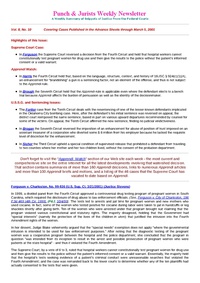Here, although the Court questioned why possession of child pornography under USSG § 2G2.4 is punished differently than receiving child pornography under USSG § 2G2.2, it.
The defendant in this case pled guilty to receiving and possessing child pornography (including visual depictions) in violation of 18 U.S.C. §§ …
Here, in a decision that was subsequently reversed by the Supreme Court, the Fourth Circuit dismissed a civil suit by the SEC to recover stolen funds on the grounds that the federal securites laws do not reach every claim for theft and conversion.
The defendant in this case …
Two months after he entered a guilty plea to a bribery charge, the defendant in this case moved pro se to withdraw his guilty plea, claiming that he had been coerced into entering the plea by his counsel. Among the allegations he made were that, when he asked his …
Here the Court reversed an enhancement for abuse of position of trust imposed on a company's assistant treasurer, stating that even though his position significantly aided the commission of his crime that did not override the clerical nature of his job.
This is an interesting decision dealing with …
Here the Court held that an attempt to withdraw a guilty plea on issues that relate directly to guilt justifies a refusal to grant a sentencing departure for acceptance of responsibility under USSG § 3E1.1 and the defendant bears the burden of proof.
The defendant in this case …
In this drug case, involving a conspiracy count and a possession with intent to distribute count, the Court held that the use of consecutive sentences pursuant to USSG § 5G1.2(d) under the practice known as stacking did not violate Apprendi.
Here the Court approved the use of stacking …
Here the Court held that, based on the language, structure, context, and history of 18 USC § 924(c)(1)(A), an enhancement for "brandishing" a gun is a sentencing factor, not an element of the offense, and thus is not subject to the Apprendi-rule.
This case addresses the impact, if …
This is one of those cases that shows the great and abiding concern of a benevolent government for the care and well-being of its huge numbers of ex-felons. The defendant in this case was convicted of drug trafficking; and she was initially sentenced to six years in prison, to …
Here the Court held that the fact that the amount of marijuana possessed by the defendant was neither alleged in his indictment nor determined by the jury rose to the level of plain error and entitled the defendant to resentencing.
In this case the defendant challenged his 70-month …
In 1999, a divided panel from the Fourth Circuit approved a controversial drug testing program of pregnant women in South Carolina, which required the disclosure of drug abuse to law enforcement officials. (See, Ferguson v. City of Charleston, 186 F.3d 469 (4th Cir. 1999) (P&J, 10/4/99). The tests led …
Here the Court observed that downward departures for presentence rehabilitation are "hen's teeth rare, and our precedent makes clear that such departures should be granted sparingly".
One of the issues addressed in this case was the propriety of a downward departure for presentence rehabilitation. In commenting on such …
Adhering to the rigid line of anti-Apprendi decisions from the Seventh Circuit, the Court in the instant case (a) rejected a constitutional challenge to the provisions of 21 U.S.C. § 841 (that was based on the grounds that the statute did not mention the burden of persuasion, or the …
This case involves the re-sentencing of one of the lesser-known defendants who was prosecuted for his involvement with Timothy McVeigh and Terry Nichols in the bombing of the Murrah Federal Building in Oklahoma City in 1995. It is noted principally for its discussion of a significant limitation on the …
